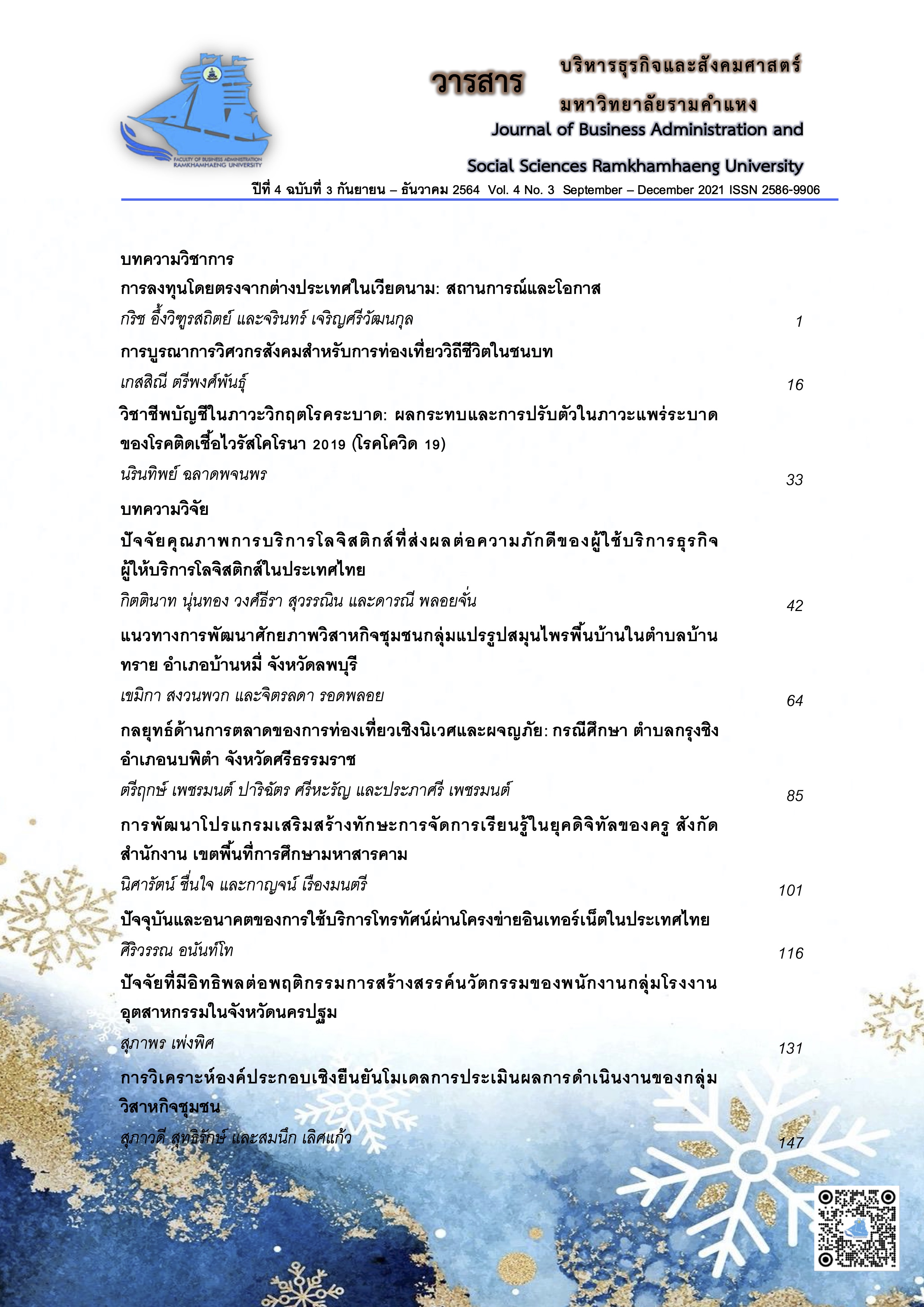The Development of a Program to Enhance the Learning Management Skills in the Digital Era of Teachers Under the Secondary Educational Service Area Office Maha Sarakham
Main Article Content
Abstract
In this research investigation, the researchers examine 1) current conditions, desirable conditions and the needs for the learning management skills in the digital era of teachers under the Secondary Educational Service Area Office Maha Sarakham; and develop 2) a program to enhance the learning management skills in the digital era of the teachers under study.
The research was conducted in two phases. In the first phase, the current conditions, desirable conditions, and the needs for the learning management skills in the digital era of teachers were studied. The sample population consisted of 320 school administrators, heads of academic sections, and teachers using the technique of stratified random sampling. The research instrument was a questionnaire. The statistics used in data analysis were percentage, mean, and standard deviation. The technique of priority needs index (PNI) was also employed. In the second phase, a program to enhance the learning management skills in the digital era of teachers was developed. Key informants consisted of one school administrator and four teachers with best practices and five educational experts using the technique of purposive sampling. The research instrument was a semi-structured interview form and an evaluation form for appropriateness and feasibility of the program. The statistics used in data analysis were mean and standard deviation.
Findings are as follows: 1) The current conditions of the learning management skills in the digital era of the teachers under investigation were at a moderate level. The desirable conditions were at the highest level. The needs for skill development in descending order were the use of information technology and communication; classroom management; learning management design; and learning measurement and evaluation. 2) The evaluation of the appropriateness of the program constructed was at a high level and the feasibility was at the highest level.
Article Details

This work is licensed under a Creative Commons Attribution-NonCommercial-NoDerivatives 4.0 International License.
เนื้อหาและข้อมูลในบทความที่ลงตีพิมพ์ในวารสารบริหารธุรกิจและสังคมศาสตร์ มหาวิทยาลัยรามคำแหง ถือเป็นข้อคิดเห็นและความรับผิดชอบของผู้เขียนบทความโดยตรง ซึ่งกองบรรณาธิการไม่จำเป็นต้องเห็นด้วย หรือร่วมรับผิดชอบใดๆ
บทความ ข้อมูล เนื้อหา รูปภาพ ฯลฯ ที่ได้รับการตีพิมพ์ในวารสารบริหารธุรกิจและสังคมศาสตร์ มหาวิทยาลัยรามคำแหง ถือเป็นลิขสิทธิ์ของวารสารบริหารธุรกิจและสังคมศาสตร์ มหาวิทยาลัยรามคำแหง หากบุคคลหรือหน่วยงานใดต้องการนำบทความทั้งหมดหรือส่วนหนึ่งส่วนใดไปเผยแพร่ต่อ หรือเพื่อกระทำการใดๆ จะต้องได้รับอนุญาตเป็นลายลักษณ์อักษรจากวารสารบริหารธุรกิจและสังคมศาสตร์ มหาวิทยาลัยรามคำแหง ก่อนเท่านั้น
References
บุญชม ศรีสะอาด. (2553). การวิจัยเบื้องต้น (พิมพ์ครั้งที่ 8). กรุงเทพฯ: สุวีริยาสาส์น.
พิมพ์พันธ์ เดชะคุปต์ และพเยาว์ ยินดีสุข. (2557). การจัดการเรียนรู้ในศตวรรษที่ 21. กรุงเทพฯ : โรงพิมพ์จุฬาลงกรณ์มหาวิทยาลัย.
ลำยวน ไวทำ. (2562). โปรแกรมพัฒนาสมรรถนะครูด้านการจัดการเรียนรู้ที่เน้นการคิดวิเคราะห์ในสถานศึกษา สังกัดสำนักงานเขตพื้นที่การศึกษามัธยมศึกษาเขต 26. วิทยานิพนธ์การศึกษามหาบัณฑิต, มหาวิทยาลัยมหาสารคาม.
วิจารณ์ พานิช. (2555). วิถีสร้างการเรียนรู้เพื่อศิษย์ในศตวรรษที่ 21. มูลนิธิสดศรี-สฤษดิ์วงศ์ : กรุงเทพฯ.
สุกัญญา แช่มช้อย. (2562). การบริหารสถานศึกษาในยุคดิจิทัล = School Management in Digital Era(พิมพ์ครั้งที่ 2). กรุงเทพฯ: สำนักพิมพ์แห่งจุฬาลงกรณ์มหาวิทยาลัย.
สุริยาพร นพกรเศรษฐกุล. (2561). ทักษะการจัดการเรียนรู้ในศตวรรษที่ 21 ของครูโรงเรียนมัธยมศึกษาจังหวัดระยอง สังกัดสานักงานเขตพื้นที่การศึกษามัธยมศึกษา เขต 18. วิทยานิพนธ์การศึกษามหาบัณฑิต, มหาวิทยาลัยบูรพา.
สำนักงานเขตพื้นที่การศึกษามัธยมศึกษามหาสารคาม. (2563). นโยบายสำนักงานเขตพื้นที่การศึกษา มัธยมศึกษามหาสารคาม. สืบค้นจาก http://ses26.go.th/.
อาภรณ์ ภู่วิทยพันธ์. (2559). การพัฒนาขีดความสามารถของบุคลากรบนพื้นฐาน 70:20:10 Learning Model. กรุงเทพฯ: เอช อาร์เซ็นเตอร์.
Cooper, M. J. (2011). Classroom Teaching Skills. Belmont: Wadsworth Cengage Learning.
Hague, C., & Payton, S. (2010). Digital literacy across the curriculum. Bristol: Futurelab.
Krejcie, R. V., & Morgan, D. W. (1970). Determining sample size for research activities.
Educational and psychological measurement, 30(3), 607-610.
Lombardo, M. M., & Eichinger, R. W. (1996). FYI: For your improvement: a guide for development
and coaching. The Leadership Architech Suites. MN: Lominger.
Özgür, H. (2021). Improving Teachers’Qualifications for Preparing ICT Based Educational
Materials. Malaysian Online Journal of Educational Technology, 9(1), 48-69.


